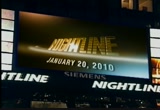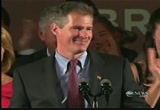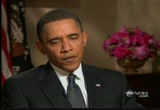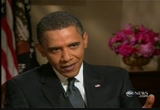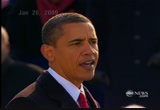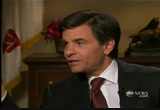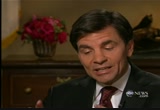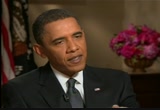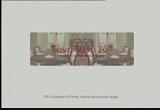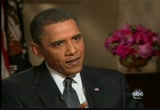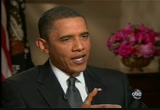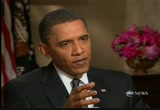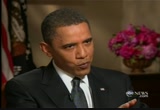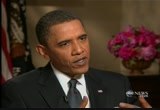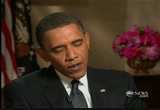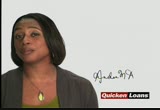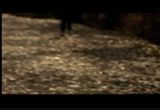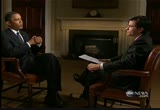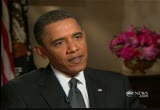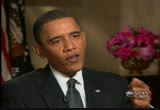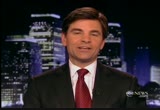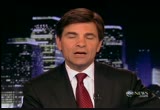tv Nightline ABC January 20, 2010 11:35pm-12:05am EST
11:35 pm
tonight on "nightline," president obama with the exclusive. a day after massachusetts voters deal a stinging rebuke to the democratic party and his ambitious agenda, the president goes one on one with george stephanopoulos. plus, presidency in peril? at this pivotal moment in a difficult year, the president answers his critics. but with health care in the balance, can he reset the tone? the tough questions, the candid answers. a special edition of "nightline," president obama, the first year, starts right now. >> announcer: from the global resources of abc news, with terry moran, martin bashir and cynthia mcfadden in new york city, this is "nightline," january 20th, 2010.
11:36 pm
>> good evening, i'm cynthia mcfadden. we begin tonight with politics, and an exclusive interview with president barack obama. exactly one year to the day after he was sworn into office. the timing couldn't be more critical, with democrats licking their wounds after a stunning special election upset in massachusetts, with republican scott brown winning the seat that was once ted kennedy's. the president's one-year anniversary was nothing but celebratory. my colleague george stephanopoulos sat down earlier today with the president at the white house. george? >> reporter: cynthia, i think the safest thing to say, this is not how the white house expected our planned to spend today. they hadn't even paid that much attention to the senate race in massachusetts until just a couple of weeks ago. and then, the bottom fell out. by the time the white house saw it coming, it was too late. >> i bet they can hear this cheering all the way in washington, d.c.!
11:37 pm
>> reporter: in less than 24 hours before the one-year anniversary of president obama's inauguration, the voters of that bluest of states, massachusetts, sent a powerful rebuke to the president, voting republican scott brown into the senate over democratic martha coakley. a political nightmare for obama that will change the course of his presidency. and so today, with his agenda under fire, and more than 60% of the country saying we're on the wrong track, we sat down with president obama in the roosevelt room, a year to the day, almost the hour, from that icy january moment when he became president. so looking at that clock, one year ago, you were just about to take the oath of office. and now you get this anniversary presence from the voters of massachusetts. robert gibbs said you were surprised and frustrated by the vote. is that accurate? >> here's my assessment of not
11:38 pm
just the vote in massachusetts, but the mood around the country. the same thing that swept scott brown into office swept me into office. people are angry and they're frustrated. not just because of what's happened in the last year or two years, but what's happened over the last eight years. and here in washington, from their perspective, the only thing that happens is is that we bail out the banks. >> reporter: but you're in charge now. >> it was the right thing to do for us to salvage the financial system. and i make no apologies for that at all. but we knew at the time how politically toxic that was. >> reporter: republicans say the anger goes beyond the bailout. michael steele says it's a repudiation of your entire agenda. >> well -- i think if he's suggesting that people voted against credit card reform or prevention of housing fraud reform or that they were voting against national service or they were voting against the 4 million children who have health insurance now because of the
11:39 pm
steps that we've taken, i don't think that's a plausible claim. >> reporter: probably talking about health care. >> talk to all those people out there right now who have lost their health care during the course of this year because they've lost their jobs or all the small businesses who have seen the premiums that they're paying going up 20%, 25%. you know, the reason i tackled health care wasn't because this was my personal hobby horse. the reason i tackled it was, because during the course of the campaign, i traveled across this country and i kept hearing heartbreaking stories about families that were bankrupt when they got sick. when i got here and looked at how we were going to get control of our long-term debt, i realized that there was no way for us to control our long-term debt unless we reform how our health care system works. >> reporter: but you made a decision in this first year to push through the bulk of your agenda right away. some would say focus on our economy, our system can't handle too much. you took that on in your
11:40 pm
inaugural address. >> there are some who question the scale of our ambitions, who suggest that our system cannot tolerate too many big plans. their memories are short. for they are forgotten what this country has already done. >> reporter: looking back now, don't those critics have a point? >> here's the problem, though. if we didn't take on health care, then when we were going to take it on? and if we don't take it on, then wh what are we going to say to families when two years, three years, four years from now their premiums have gone up 30%, 40%? now, part of the problem we've got is that a process in washington to actually solve problems, to talk about them in honest ways, to, you know, think about people first and not the special interests and the lobbyists who are disproimportance gnat power here -- >> reporter: you're not on the campaign trail, you're here in
11:41 pm
the white house. you're the head of this system. you promised transparency, putting the health care debates on c-span. you promised to get rid of earmarks, they look at the health care bill and see the carveouts for nebraska and louisiana. they say you're not living up to your promises. >> look, there's no doubt that, when i look back at the course of this year, what i'm constantly balancing is, how do i move on these big agendas? and at the same time, try to reform a system that has a lot of bad hab bipts built up into it? so, am i satisfied with the progress that we've made on changing how washington works -- >> reporter: you become complicit. >> absolutely not. was fighting for those things worth it, even though there are compromises that have to be made along the way, i would say yes. >> reporter: but your allies are saying, you are going to have to listen to the message in massachusetts. listen to evan bayh yesterday. >> if you lose massachusetts, if that's not a wakeup call, there's no hope of waking up.
11:42 pm
>> reporter: he says democrats have to reach out, slow down the agenda because americans just onto buying what the democrats are selling. >> what is absolutely true, during the course of this year, you have a situation where you have to take a lot of steps quickly that we know are unpopular but were necessary, and if you ask the average person what was our stimulus package, they'll tell you, the bank bailout. and, you know, i can say, well, no, actually, that started before i was sworn in and we managed it very well, but it doesn't negate that sense on people's part that nobody is looking after them in an extremely tough situation. so -- the reason i say that we are not surprised by what happened in massachusetts is because i'm frustrated, too. i'm frustrated by the fact that over the last decade, we have not seen the kind of progress for middle class families that are needed. that's what i promised to deliver in the campaign.
11:43 pm
it's not something that i believe that we can get done in a year. but it is something that i think we are starting to make progress on. >> reporter: when we come back, a president under pressure. what does he do now? what's going on? we ordered a gift online and we really need to do something with it... i'm just not sure what... what is it? oh just return it. returning gifts is easier than ever with priority mail flat rate boxes from the postal service. if it fits, it ships anywhere in the country for a low flat rate. plus i can pick it up for free. perfect because we have to get that outta this house. c'mon, it's not that... gahh, oh yeah that's gotta go... priority mail flat rate shipping starts at $4.95 only from the postal service. a simpler way to ship and return. nature knows just how much water vegetables need. so, to turn hose vegetables into campbell's condnsed soup,, our chefs just add less wate from the start.,/
11:44 pm
♪ so many, many reasons so, doctor... i've been thinking... no. you know how... no. so, doc, i've got this friend... [ male announcer ] talking to your doctor about erectile dysfunction isn't easy. actually, doc, there is something i want to talk to you about. [ male announcer ] but it's definitely a conversation worth having. twenty million men have had their viagra talk. when you're ready for yours, visit viagra.com for helpful conversation starters and to learn how viagra can help. ask your doctor if your heart is healthy enough for sex. don't take viagra if you take nitrates for chest pain as it may cause an unsafe drop in blood pressure. side effects may include headache, flushing, upset stomach, and abnormal vision. to avoid long-term injury, seek immediate medical help for an erection lasting more than four hours. stop taking viagra and call your doctor right away if you experience a sudden decrease or loss
11:45 pm
11:46 pm
we con we continue now with george stephanopoulos' exclusive interview with president obama. the topic, health care, and what happens after yesterday's upset in massachusetts, now that democrats no longer have a 60-vote super majority? as scott brown hes to washington tomorrow, what will the president do about health care? give up? try to ram it through? or set a different course? >> reporter: coming out of massachusetts, you don't have 60 votes. >> right. >> reporter: in the senate right now. what is the strategy on health care going forward? >> if we hadn't taken on health
11:47 pm
care, people would be asking right now, why is it having promised to do something about that during the campaign that we're seeing millions of people who have lost their health care and their premiums going up. >> reporter: they want your health care plan to go away. it's not just popular. majority are opposed. >> here's what i know. when they actually find out what's in the proposals, for insurance reform, for making sure that we're making health care more affordable, those provisions are very popular. >> reporter: you made that speech in august. >> and one of the things that i learned in washington is that you have to repeat yourself a lot, because unfortunately it doesn't penetrate. but i'm determined to make sure that issues that are making middle class families, ordinary americans less secure and less stable are faxed. >> reporter: how do you do it now? the strategy getting the house to pass the senate bill. speaker pelosi said yesterday that was a nonstarter. >> here's one thing i know, and i want to make sure this is off
11:48 pm
the table. the senate certainly shouldn't try to jam anything through until scott brown is seated. people of massachusetts spoke. he's got to be part of that process. so -- >> reporter: number one. >> that's point number one. i think point number two is that it is very important to look at the substance of this package and for the american people to understand that a lot of the fear mongering around this bill isn't true. i would advise that we try to move quickly to coalasce drn. >> reporter: starting with the smaller core package? >> well, look, i'm not going to get into legislative strategy. first of all, my job is to, as president, is to send a message in terms of where we need to go. it's not to navigate how congress. >> reporter: set direction. >> it's to set direction. and the direction i think that has to be set is to identify
11:49 pm
those core elements of this package, and to get that done. >> reporter: you're not advocating the house pick up the senate bill. >> i can't force them to do that. now, i will tell you, and i've said this before, that the house and the senate bill overlap about 90%. at the same time, as we recognize that what i've been doing since day one, i'm not here a year, every day, what i've been worrying about is, how do i get this company back on track? now, that hasn't always been publicized. it has -- >> reporter: is that your fault? >> what i would say is that in this political environment, what i haven't always been successful in doing is breaking through the noise and speaking directly to the american people in a way that during a campaign you can do. >> reporter: that's going to keep happening as long as health care is being gnegotiated. >> that's why i think it's important to get something done. i notice the republicans say well, we actually wanted to do health care, we didn't --
11:50 pm
>> reporter: michael steele said that to me this morning. >> i think it's important to remind everybody that this process having conversations with republicans for months and asking them what exactly they wanted to do and what their solutions -- >> reporter: going to call them back in? >> well, if they have clear plans and clear ideas in terms of how to move forward on issues, i'm always open to that. look. i have every interest in seeing a unified country solving big problems. >> reporter: we're not there right now. how much of that is your fault, that republicans and democrats haven't come together? >> you know, we have a political culture that has built up over time that has gotten more and more polarized. my hope was, a year ago today, when i was being sworn in, that reversing that process was going to be easy, partly because we were entering into a crisis situation, and i thought that the urgency of the moment would allow us to join together and
11:51 pm
make common cause. that hasn't happened. i have not been able to change the tone here in washington. i'm going to keep on trying, though. what we can't do is simply say, we're going to stand pat and avoid big problems, because they're just too hard politically. that's part of the advice, i think, that was given last year to me, was, look, you can't get a health care bill through because the insurance companies will send millions of dollars of advertising against it. you can't do energy because big oil is going to be opposed. i mean -- on each of these issues the conventional political wisdom is don't take it on, because when you take it on, it gets ugly, people get mad, there's a lot of distortions in the system, and you're poll numbers will go down. >> reporter: you make all the
11:52 pm
same choices today? >> and -- i -- look, have i made mistakes during the course of the year, absolutely. i mean -- i don't think there's been an interview in which i didn't talk about some -- >> reporter: it's usually about communication, it's not about policy. >> i don't know how we avoid taking on these big problems. now -- i could have said, well, we'll just do what's safe. we'll just take on those things that are completely noncontroversial. the problem is, things that are noncontroversial end up being things that don't solve the problem. >> reporter: and when we come back, the president reflects. a year in the world's most back, the president reflects. a year in the world's most powerful and toughest job. to check the statusr loan onl. for yu securely, any time, anywhere. our e signature technology makes it really easy... for you to sign your documents from home. we've helped over three-quarters of a million families... refinance or purchase their home. it's how we've done things at quicken loans for 25 years now.
11:53 pm
it's why quicken loans is one of america's largest mortgage lenders. - and that's why i love... - i love being a home loan expert. ♪ the same impressive highway uel economy you get in a mini. now, in a not-so-mini size. the all-new gmc terrain. with an epa estimated 32 miles per gallon highway. may the best car win.
11:54 pm
11:56 pm
>> announcer: "nightline" cont >> announcer: "nightline" continues from new york city with cynthia mcfadden. >> president obama's senior adviser david axelrod joked with abc's chief white house correspondent jake tapper earlier today, saying he would rather have had a cake to mark the historic inauguration than yesterday's stunning loss in massachusetts. as we continue with abc's exclusive interview with the president, george stephanopoulos
11:57 pm
presses him on where he thinks he went wrong in his first year. but first, what about haiti? >> reporter: let me ask you about haiti. our martha raddatz had a report yesterday where she showed the u.s. military being greeted by shouts of joy on the ground in haiti, and what was interesting about it, the people there thought the u.s. government had come to take over, and they were really happy about it. martha raddatz described it as a please occupy us atmosphere. is that where we're headed? >> no. we are being very careful about working with the haitian government, we're being very careful about working with the united nations, which already had peacekeeping forces on the ground. to deal with the immediate emergency, search and rescue and relief. we've got to help haiti stand back up. >> reporter: can we afford it? >> well, i think we can't afford not to do it, because haiti is our neighbor. i want to make sure that when
11:58 pm
america projects its power around the world, it's not seen only when it's fighting a war. it's got to also be able to help people in desperate need, and ultimately, that will be good for us. that will be good for our national security over the long-term. >> reporter: i atime this has been about the most packed year of your life. >> it has. >> reporter: the most fulfilling? >> yes. during the course of this year, we've had to make some decisions that were unpopular. we made some mistakes. i've personally made some mistakes. but what i can tell you is, a year later, i've never been more optimistic about the possibilities of america. i'm certainly a lot more optimistic than i was a year ago. if we can get through 2009, as tough as year as it was, where a pandemic flu ranked about eighth on my to-do list, and ended with an attempted terrorist attack
11:59 pm
and then a cat cliz similar in our neighborhood, in haiti, if we can come through 2009 and still not just be standing but all kinds of good things happening out in the country, then i'm very optimistic about where we can go. what i haven't been able to do yet, and this was -- this is what i was hired to do, is to close the gap between the values of the american people and the values of washington. and the values of wall street. and, you know, if there's one -- one thing that i regret this year is that we were so busy just getting stuff done and dealing with the immediate crises that were in front of us, that i think we lost some of that sense of -- of, you know, speaking directly to the
12:00 am
american people about what their core values are, and why we have to make sure those institutions are matching up with those values. and that, i do think is a mistake of mine. i think the assumption was, if i just focus on policy, if i just focus on the, you know, this provision of that law or, are we making a good, rational decision here, that people will get it. and i think that, you know, what they've ended up seeing is this feeling of remoteness and detachme detachment. do they really get us, and what we're going through? and i think that i can do a better job of that, and partly because i do believe that we're in a stronger position now than we were in a year ago. >> reporter: mr. president, thanks very much. >> thank you. appreciate it. >> the president of the united states. well, george, how did he do?
12:01 am
>> reporter: i think he warmed up to it over the course of the interview, cynthia. i think you saw to the end, you know, that summation of his first year in office. the president making the kinds of concessions that i think a lot of people out in the country expecting to hear. now, the white house has had some time to prepare for this. they saw this coming about a week ago. that was too late, though, as i said, right at the top. there was really nothing they could do. they knew they had to go show the flag in massachusetts on sunday. not expecting it would do much good, but you know, they're going to have to -- they still have a lot of tough decisions going forward, especially on health care. >> so, how are they going to pivot? the state of the union is coming up. >> reporter: that is the big moment. they have to get through the health care debates. you saw the president basically signal that he knows the big bills that passed the house and the senate are dead, and they're going to have to try to come together around a much smaller
12:02 am
bill. i expect that the president will be more concrete next week when he gives the state of the union, but he's going to have to put more meat on the bones. not only suggest a different course rhetorically or say he has to communicate better, but signal to the country where his priorities are, and i would expect so much of the focus, bank it, is going to be on jobs. >> four-letter word. george stephanopoulos, thank you so much, as always, for that tonight. we'll be right back with tonight's closing argument, but first, here's jimmy kimmel with what's coming up next on abc. >> jimmy: thanks, cynthia. tonight, paul bettan, the bachelor, jake pavelka, and music from pearl
137 Views
IN COLLECTIONS
WMAR (ABC) Television Archive
Television Archive  Television Archive News Search Service
Television Archive News Search Service 
Uploaded by TV Archive on

 Live Music Archive
Live Music Archive Librivox Free Audio
Librivox Free Audio Metropolitan Museum
Metropolitan Museum Cleveland Museum of Art
Cleveland Museum of Art Internet Arcade
Internet Arcade Console Living Room
Console Living Room Books to Borrow
Books to Borrow Open Library
Open Library TV News
TV News Understanding 9/11
Understanding 9/11
